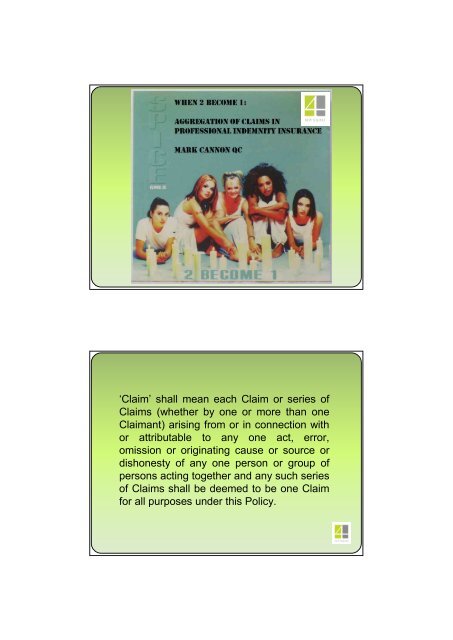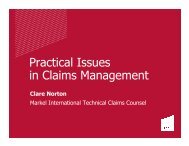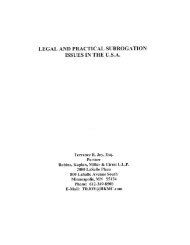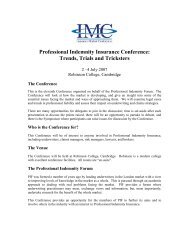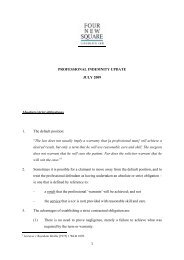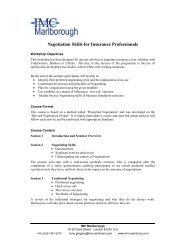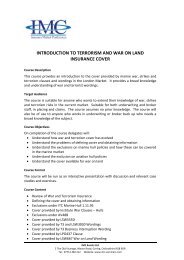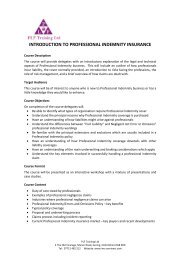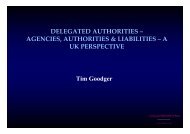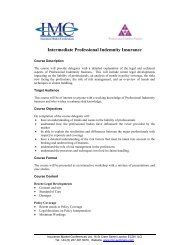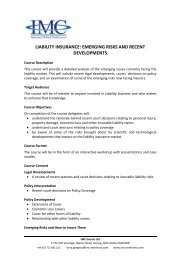When Two Becomes One: Aggregation of Claims
When Two Becomes One: Aggregation of Claims
When Two Becomes One: Aggregation of Claims
You also want an ePaper? Increase the reach of your titles
YUMPU automatically turns print PDFs into web optimized ePapers that Google loves.
‘Claim’ shall mean each Claim or series <strong>of</strong><strong>Claims</strong> (whether by one or more than oneClaimant) arising from or in connection withor attributable to any one act, error,omission or originating cause or source ordishonesty <strong>of</strong> any one person or group <strong>of</strong>persons acting together and any such series<strong>of</strong> <strong>Claims</strong> shall be deemed to be one Claimfor all purposes under this Policy.
If you say <strong>of</strong> a claim against a defendant that it isfor £100, you have said all that is necessary toidentify it as a claim; but if you say <strong>of</strong> it that it is forfraud or negligence, you have not distinguished itfrom a charge or allegation. In particular, if youidentify a claim as something that has to be paid …it must be something that is capable <strong>of</strong> separatepayment: you cannot pay a cause <strong>of</strong> action. Itfollows, I think, that if there is only one objectclaimed by one person, then there is only oneclaim, however many may be the grounds or thecauses <strong>of</strong> action which can be raised in support <strong>of</strong>it: …
To suggest as [the third party claimant]has done that each separate cause <strong>of</strong>action which was the cause <strong>of</strong> a singleclaim gives rise to separate additionallimits <strong>of</strong> liability for that claim stands theclause on its head; it is a contentioncontrary to its plain commercial purpose.
In my view, looking at the demand in the letterbefore action, the formulation <strong>of</strong> the statement <strong>of</strong>claim and the annexed schedule <strong>of</strong> damages(where one single sum was claimed) and thereality <strong>of</strong> the position, I have no doubt but thatthere was one claim by [the third party claimant]for the damage caused by the fire. The divisionmade by [the trial judge] was solely for thepurpose <strong>of</strong> distinguishing between the soleliability <strong>of</strong> [the insured] for the damage to thecabling and the other damages for which all <strong>of</strong> thethree defendants in that action were liable.
In my judgment, the three requirements<strong>of</strong> a relevant event are that there was acommon factor which can properly bedescribed as an event, which satisfiedthe test <strong>of</strong> causation and which was nottoo remote for the purposes <strong>of</strong> theclause.
In ordinary speech, an event issomething which happens at a particulartime, at a particular place, in a particularway. …A cause is to my mind somethingaltogether less constricted. It can be acontinuing state <strong>of</strong> affairs; it can be theabsence <strong>of</strong> something happening.Whilst an event, occurrence or claim is‘something which happens at a particulartime, at a particular place in a particularway’ a ‘cause’ is not just ‘somethingaltogether less constricted’ it is a wordwhich is fulfilling a different function. Theword event, occurrence or claim describeswhat has happened; the word ‘cause’describes why something has happened.
Insurers' total liability under this Policy inrespect <strong>of</strong> any Claim or <strong>Claims</strong> arisingfrom one originating cause, or series <strong>of</strong>events or occurrences attributable to oneoriginating cause or related causes, shallin no event exceed the sum stated in Item3(a) <strong>of</strong> the Schedule.
A culpable misappreciation by anindividual which leads him to commit anumber <strong>of</strong> negligent acts can arguably besaid to constitute a single event ororiginating cause responsible for all thenegligent acts and their consequences.The same is not true when a number <strong>of</strong>individuals each act under an individualmisappreciation, even if the nature <strong>of</strong> thatmisappreciation is the same.For the purpose <strong>of</strong> this reinsurance theterm 'each and every loss' shall beunderstood to mean each and every lossand/or occurrence and/or catastropheand/or disaster and/or calamity and/orseries <strong>of</strong> losses and/or occurrencesand/or disasters and/or calamities arisingout <strong>of</strong> one event.
If a series <strong>of</strong> third party claims shall resultfrom any single act or omission (or relatedseries <strong>of</strong> acts or omissions) then,irrespective <strong>of</strong> the total number <strong>of</strong> claims,all such third party claims shall beconsidered to be a single third party claimfor the purpose <strong>of</strong> the application <strong>of</strong> thedeductible.
one occurrence or all occurrences <strong>of</strong> aseries consequent upon or attributableto one source or original causeIn my view, the lack <strong>of</strong> proper training <strong>of</strong>the selling agents and selling employeeswas behind the whole problem. It was thiswhich, on the assumed facts, was aconsistent and necessary factor whichallowed the mis-selling to occur. Maybe,the activities <strong>of</strong> individual salesmen werealso causative but the clause entitles oneto move back and find a single source ororiginal cause; and in this case, there isone.
the word ‘originating’ was in my viewconsciously chosen to open up thewidest possible search for a unifyingfactor in the history <strong>of</strong> the losseswhich it is sought to aggregate.the distribution <strong>of</strong> a misleadingdocument in identical terms bysomeone who was not himselfnegligent but ought to have beencorrected by someone else who was.The two acts or omissions would be aseries which together caused each <strong>of</strong>the losses
all claims or losses … arising out <strong>of</strong> or attributable toor consequent upon(a) the same or similar or related occurrencescircumstances events acts errors or omissions <strong>of</strong> theAssured including an act or acts <strong>of</strong> dishonesty or(b) any series or multiplicity <strong>of</strong> similar or relatedoccurrences circumstances events acts errors oromissions <strong>of</strong> the Assured including a series ormultiplicity <strong>of</strong> acts <strong>of</strong> dishonestyand whether involving or committed or omitted byany person or persons or companies acting togetheror jointly or in concert or separately or independentlyshall constitute a single claimall <strong>Claims</strong> against any one or moreInsured arising from:(i)….(ii)one series <strong>of</strong> related acts or omissions;(iii)the same act or omission in a series <strong>of</strong>related matters or transactions;(iv)similar acts or omissions in a series <strong>of</strong>related matters or transactions…will be regarded as one Claim.
Where a contract has been pr<strong>of</strong>essionallydrawn… the draftsman is certain to have inmind decisions <strong>of</strong> the Courts on earliereditions <strong>of</strong> the clause. Such decisions arepart <strong>of</strong> the context or backgroundcircumstances against which the particularcontract falls to be construed. If thedraftsman chooses to adopt the same wordsas previously construed by the Courts, itseems to me to be likely that, other thingsbeing equal, he intends that the wordsshould continue to have the same meaning.each and every loss and/or occurrenceand/or catastrophe and/or disaster and/orcalamity and/or series <strong>of</strong> losses and/oroccurrences and/or catastrophes and/ordisasters and/or calamities arising out <strong>of</strong>one event
The losses or series <strong>of</strong> lossesenvisaged by the clause must have“arisen out <strong>of</strong>” one event, which in thiscontext straightaway implies somecausative element and some degree <strong>of</strong>remoteness, or lack <strong>of</strong> remoteness,which must be established in thecircumstances <strong>of</strong> the particular case.The language <strong>of</strong> the aggregationclause, read with the definition <strong>of</strong> “act oromission”, shows that the insurers werenot willing to accept as a unifying factora common cause more remote than theact or omission which actuallyconstituted the cause <strong>of</strong> action. An actor omission could qualify as a unifyingfactor in respect <strong>of</strong> more than one lossonly if it gave rise to civil liability inrespect <strong>of</strong> both losses.
All claims or series <strong>of</strong> claims (whetherby one or more than one claimant)arising from or in connection with orattributable to any one act, error,omission or originating cause orsource, or the dishonesty <strong>of</strong> any oneperson or group <strong>of</strong> persons actingtogether, shall be considered to be asingle third party claim for the purposes<strong>of</strong> the application <strong>of</strong> the Deductible.Whereas in Axa the words used were “arisingfrom”, and in Municipal Mutual and Countrywidethe words used were “consequent on orattributable to”, the Policy here uses the words“arising from or in connection with orattributable to” (emphasis added). The phrase“in connection with” is extremely broad andindicates that it is not even necessary to show adirect causal relationship between the claimsand the state <strong>of</strong> affairs identified as their“originating cause or source”, and that someform <strong>of</strong> connection between the claims and theunifying factor is all that is required.
for financial loss caused by a breach on thepart <strong>of</strong> the assured or an <strong>of</strong>ficer or employee<strong>of</strong> the assured <strong>of</strong> the provisions <strong>of</strong> theFinancial Services Act 1986 (including withoutlimitation any rules or Regulations made byany regulatory authority or any self regulatoryorganisation pursuant to the provisions <strong>of</strong> theAct)…in respect <strong>of</strong> which civil liability ariseson the part <strong>of</strong> the assured.


